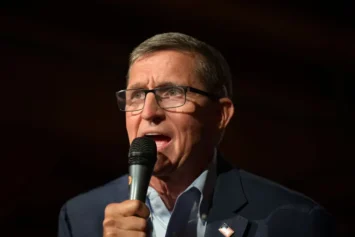Is an American story tragic if the hero becomes a massive success, if he follows the same rules others use to obtain greatness and actually gets to the mountaintop as the crowds cheer?
The answer might depend on whose mountaintop it is.
At least in the 1972 Robert Redford classic film “The Candidate,” the all-too-accurate tale of the American political system’s many malfunctions, the man and the system matched: white liberal Bill McKay — a found soul that becomes lost, played expertly by Redford — and America’s very white political system. Black Americans were still on the nation’s elite outskirts then, talking about everything from Marxist revolution to radical social change to pragmatic reform.
During this earth-shaking period, a child semi-abandoned by a womanizing and wandering Kenyan father and a devoted-to-scholarship white Kansan mother is born, and grows up in Indonesia and his native Hawaii. He grows up not as a tragic mulatto — not really — but as a Hawaiian, an American. He smokes a lot of weed and reads a lot of books. He only knows three Black people during his entire childhood through high school, so he learns to believe in truth, justice and The American Way, leaning not onto any Black understanding.
David Garrow, the author of the new biography on Obama, “The Rising Star: The Making of Barack Obama” casts Barry Obama as youngster who spends a long time finding his identity. As a boy, he took from his Indonesian step-father the power of being stoic and stone. “Better to be strong. If you can’t be strong, be clever and make peace with someone who is strong. But better to be strong.”This is Obama quoting his stepfather in “Dreams from My Father.”
Power came from within a controlled breast. As a level, but pot-headed teenager, he developed his powers and abilities and slowly decided that using that mellow power to rise to the top of every endeavor could be a way to fill the emptiness, to stitch a whole person from Kenya, Indonesia and Hawaii. The young Barry recreated himself as Barack Obama, a centered centrist.
Sadly, Malcolm X and Martin Luther King were the mortar for Barry’s stone smile. He learned from King that the nation and the world belonged to him if he just fit within it and accepted America’s greatness. He gleaned from Malcolm the act of reinvention: His “repeated acts of self-creation spoke to me … forged through sheer force of will.” The politics of the two men were examined but were found wanting in a world filled with elite schools, partying with a crew and thinking about the future. His African and Indonesian identities were in fragments; it was his white American identity, the one he formed with his white grandparents in Hawaii, that was stable. Besides, that Pan-Africanism stuff was seen as a failed philosophy to match his failure of a father.
The times, they changed. King became a nation’s conscience. Malcolm became a living weapon of Black independence. Barry grew into Barack, a blank billboard in which he beckoned America to write. King tested the idea that white Americans could evolve to being actual Christians; raptivist Sister Souljah famously said in a well-known Public Enemy song that King “tried to teach white people the meaning of civilization.” Malcolm tested the limits of mental, social, political, spiritual and physical decolonization, starting with him and spreading outward throughout the Black world. Obama tests himself—in college, in Chicago and at Harvard Law School—to see what’s possible for Barack Obama.
Garrow slices the fat of fiction away from fact. He quotes repeatedly that Obama wanted to be a novelist; Obama said he wanted his memoir, “Dreams From My Father,” to be viewed as “a work of the imagination.” Wanting acceptance from Chicago’s Black community, Obama used that powerful imagination to become retroactively Black, creating his own Black rage to soothe, manufacturing his own social obstacles to overcome. Like most budding American politicians, he decided to produce the legend as he went along.
It’s common knowledge that Obama, looking to ground his Black identity, found Michelle Robinson and Trinity United Church of Christ, pastored by Rev. Jeremiah Wright, at around the same time. Garrow takes that fact one step further, strongly implying that Obama’s Christian and racial identities are deliberate constructs to succeed as a Black politician, and an un-hyphenated American, at any cost.
The struggle to become Barack Obama was the struggle within himself to make flesh E pluribus unum — to make all sides, all parties, equally legitimate in public discourse. He succeeded personally in this regard, becoming a powerful intellect and an engaging college professor. But, not surprisingly, he failed miserably in applying that idea to an entire nation. It seems that America’s hegemonic power — particularly one avenue of it, the Republican Party, which teeters toward a kind of elected fascism — doesn’t want a nuanced discussion.
Obama’s Chicago work and dreams are well-documented, particularly how he and others begin to question whether the confrontation politics as defined by Chicago community organizer Saul Alinksy is played out. Instead, they see a kind of a consensus politics that allows the lamb to lay down comfortably with the lion. The unfulfilled promise of Harold Washington, the coalition-building politician who became the first African-American mayor, serves as fuel for Obama.
Obama is ambitious, so he becomes slowly agitated with Chicago agitating. His need to have real power, the kind Washington had but didn’t get the chance to use before he died, leads him to Harvard Law School. The mastery he develops there, of taking all sides of a position, would be his unspoken philosophy. (Garrow has proven writer Ta-Nehisi Coates largely right, in spirit perhaps more than in nuanced fact, that Obama is an activist, not a protestor).
He returned to Chicago with a plan: he would merge hegemony and struggle, taking the best of both. He becomes an Illinois state senator, but his restlessness increases until he gets to the U.S. Senate. Under Garrow’s avalanche of detail is a simple point: The man who fought to walk in Abraham Lincoln’s political shadow missed an important point the assassinated president understood — a person or a nation cannot remain half-slave and half-free.
Redford ended “The Candidate” with McKay in a state of personal turmoil, the man misplaced at his own victory party, wondering what comes next in the absence of principle and conviction. In the movie, his father proclaims him a politician, while McKay looks shocked by, and slightly insulted with, his new identity. After he asks the what-now question to his confused campaign manager, the crowd eventually swallows him. Obama’s personal story is without this scene, because, as he saw it, the point of all of it was to get to the summit to move the nation a single inch — to paint within the lines with the black crayon.
Time has allowed every political and social situation in America to be assessed without real fear. Social friction is now properly contained, with only the occasional Ferguson-type flare-up. Twenty-first century American radicalism is defined as noise, not social disruption and the personal sacrifice that comes with it. There is no fear of real revolution, and any evolution increasingly embraced is technological, not political. In 2017, aging Pan-Africanists, socialists and Black nationalists have left little more than compelling YouTube lecture videos.
Obama, then, is a Black liberal who exploited Black America’s need for MLK the same way William Jefferson Clinton exploited white people’s need for JFK. Garrow even quotes Obama once referring to King as a “politician,” which makes sense to a president who talked about King’s holiday as a day of community service. The change Obama heralded did happen, but it was a change of Black people’s relationship with America, a collective trading in of James Baldwin for CNN’s Van Jones. Garrow writes this biography as a cautionary tale, but this reader is afraid most Black aspiring politicians will use it as a handbook.
Like how he saw recreation in Malcolm, Obama saw passion and reconciliation in Martin. The struggle for the young Hawaiian was finding that happy medium between the two, to see progress only in that center. Obama is considered so centered and comfortable because he has never swayed into the psychic territory that makes true heroes and villains. So, he became blank, a toneless, colorless colored man who is rewarded massively for his Black-but-not-too-Black centeredness. The Obamas make Black America proud because they are achievers, but it has collectively decided not to notice that they are achieving for its own sake.
The author doesn’t have the biographer’s typical advantage of his subjects being dead; the Obamas will clearly attempt to have the last word on their story. This biography, an extremely well-done placeholder until the writing and release of the ex-president’s and the ex-First Lady’s memoirs, is equally as valuable for what it is saying about the present and the future as well as the past—a future in which Black people will give themselves public permission to see Malcolm X as a life coach and King as a civic do-gooder, and when a new army of Black politicians will be sworn in on a Ralph Bunche Bible.
Michelle and Barack Obama are the direct result of Black America’s lack of imagination, itself a result of nonstop media images of American success coupled with the reality of Black radical leaders, thinkers and dreamers being assassinated, imprisoned or socially isolated. It’s a freedom for the most educated, committed and talented Black people to be as mentally trapped as everyone else, a perverse racial and social equality.
President Trump’s six months of fear and loathing may have allowed liberals of all colors to see The Obama Era as a shining moment, but the insanity has not changed these uncomfortable truths.
—————————————————————————————————
TODD STEVEN BURROUGHS, Ph.D., is an independent researcher and writer based in Newark, New Jersey. He has taught at Howard University and Morgan State University. A professional journalist since 1985, he has written for The Source, ColorLines, Black Issues Book Review and The Crisis magazines, websites such as BlackAmericaWeb.com and TheRoot.com and newspapers such as The New York Amsterdam News, the New Jersey edition of The Afro-American newspaper chain and The (Newark, N.J.) Star-Ledger. He is the author of an audiobook, Son-Shine On Cracked Sidewalks, which deals with the 2014 mayoral election of Ras Baraka, the son of the late activist and writer Amiri Baraka, in Newark, N.J. The co-author with Herb Boyd of Civil Rights: Yesterday and Today and co-editor, with Jared A. Ball, of A Lie of Reinvention: Correcting Manning Marable’s Malcolm X, he is currently co-writing a book, with Wayne J. Dawkins, associate professor in Morgan State University’s School of Global Journalism & Communication, on Freedomways magazine.


